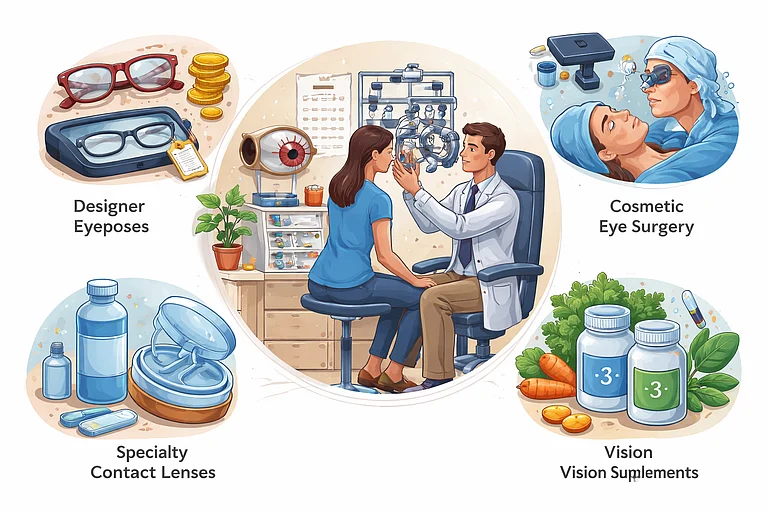Health insurance serves as a cushion that softens the blow of medical care when unexpected costs arise. To many people, employer-based health insurance sounds like a blessing, an attractive coverage plan with no cost out of pocket. However, relying on this benefit alone may not be the best approach for you to safeguard your health and financial future. While employer-sponsored plans can provide direct benefits, they are coupled with certain disadvantages that can pose risks over the long-term horizon. Here is why topping up your employer's health insurance with a personal policy makes perfect sense.
Coverage Ends with Employment
One of the most glaring pitfalls of job-based health coverage is that you become dependent on that job for medical insurance. This advantage will end when the employee chooses a new employer or is fired; even retirement eliminates coverage.
Having a personal health insurance policy ensures that you and your family remain protected regardless of your employment status. It provides continuity and eliminates the stress of finding immediate coverage during transitions.
Limited Coverage Amounts
Most employer-based health insurance plans cover less and have a lower limit than what an average employee may require. Such policies do not cater to the needs of maximum medical expenses such as admission to hospitals, major surgeries, or critical illnesses.
Personal health insurance policies allow you to choose higher coverage limits which align with your financial needs and healthcare risks.
Limited Customisation Options
Typically, employer-sponsored health insurance plans are standardised and hence lack much room for tailoring. Plans designed for groups will likely not address maternity benefits, riders on critical illness, or outpatient coverage. A personal health insurance policy allows you to tailor coverage according to your specific requirements.
According to Uma Chander, CFP CM Handholding Financials, "If your employer’s health insurance has a low coverage limit, here are practical steps you can take to supplement it: Opt for a comprehensive individual or family floater plan to ensure adequate coverage. You can also choose a sum insured based on your health history, lifestyle, age, and family size, this ensures continuity even after you leave your job or retire. Investing in Super Top-Up plans provides additional coverage beyond a threshold limit (deductible).
Critical illness policies pay a single lump sum payment if a serious disease like cancer, heart attack, or stroke is diagnosed.
You may use this amount for high medical costs, recovery expenses, or loss of income during treatment.
If there’s a history of specific illnesses (e.g., diabetes, heart conditions), look for policies tailored to such conditions. These can help cover chronic or recurring medical expenses. For example, some plans cover from day 1 -diabetes and BP, some give coverage to Cancer survivors etc and for those who have undergone angiography".
Pre-Existing Conditions and Dependents
While employer health insurance may cover pre-existing conditions, the coverage is not usually inclusive of all treatments or dependents. These plans may not cover family members or offer less than satisfactory coverage for critical health needs.
Personal health insurance policies are more comprehensive because they cover your whole family. You can also add riders for specific conditions or illnesses, which is very important for long-term financial planning.
Loss of Benefits in Retirement
Most employer-offered health insurance stops when you retire. This can be particularly frightening since healthcare costs often increase with age. You may not be able to afford a personal policy when you really need it, since you likely won't buy one earlier in life.
Starting a personal policy while you are young and healthy ensures that you are covered throughout your life. It also locks in lower premiums, which acts as a long-term safety net that can support you during your retirement years.
Limited Claim Processes and Coverage Transparency
The employer health insurance policy usually has an easier claim process for minor expenditures but may impose limitations on more valuable claims. Room rent sub-limits, co-payment clauses, or exclusions of certain treatments can surprise you when you most need them.
Personal health insurance policies have clear terms, allowing you to select plans without any hidden clauses. You can have direct communication with insurers, and hence, understanding your coverage and claim processes becomes easy.
Soaring Medical Cost
Medical costs in India are always soaring, and the healthcare inflation for 2024 was 14 per cent, which is higher than the general inflation rate. Employer health insurance policies are unlikely to increase the limits to cover this inflation, thereby providing gaps in your financial coverage.
Personal health insurance offers periodic review and upgradation, thereby ensuring that coverage will be strong enough to cope with escalated medical expenditure.
Tax Benefits
Section 80D of the Income Tax Act not only provides benefits of personal health plans by additional health insurance, but it also has tax benefits as an individual can make a deduction up to Rs 25,000 per year from the health insurance premium payments.
"You may rely solely on the health insurance that your employer is providing, but this can compromise your long-term financial security", says Suhel Chander, CFP CM Handholding Financials. He continues, "When you leave your job or retire, employer-provided health insurance usually ends. Without personal health insurance, it can be very difficult to find affordable coverage at a later age or if a serious health issue arises. In cases of unexpected job loss or a gap between jobs, you might find yourself without coverage, leaving you vulnerable to high medical expenses.
If your family depends on your employer’s health insurance, their coverage may also cease when your employment ends, putting them at risk. Medical costs tend to increase with age. Having a personal health insurance plan early on ensures lower premiums and continued coverage when healthcare needs are higher in retirement."
The health insurance benefit offered by employers is valuable but only as a beginning point rather than a solution to the whole thing. A personal health insurance policy is supplemental to what your employer provides and offers continuity, customisation, and better financial protection.















